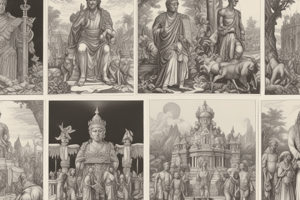Podcast
Questions and Answers
What does the origin of the word 'history' imply about its nature?
What does the origin of the word 'history' imply about its nature?
- It primarily focuses on the future.
- It involves knowledge acquired through inquiry or investigation. (correct)
- It is solely about retelling past events.
- It is based on subjective interpretations of the past.
Which statement best summarizes Herodotus's view on history?
Which statement best summarizes Herodotus's view on history?
- History is solely about collecting data.
- History is a fixed narrative that does not change.
- History should only be written by the victors.
- History involves explaining the reasons behind past actions. (correct)
What does the statement 'History is not just the past but also and principally the present and the future' imply?
What does the statement 'History is not just the past but also and principally the present and the future' imply?
- History is irrelevant to contemporary society.
- Understanding history is unimportant for societal development.
- History influences current and future events. (correct)
- The study of history ends after the past is documented.
What distinction does the term 'historiography' refer to?
What distinction does the term 'historiography' refer to?
How does Samuel K. Tan define history?
How does Samuel K. Tan define history?
Which scholar describes history as 'the achievement of man not individual but the collective'?
Which scholar describes history as 'the achievement of man not individual but the collective'?
According to Martin Luther King Jr., how are individuals related to history?
According to Martin Luther King Jr., how are individuals related to history?
What critical aspect of historical narratives is emphasized in the intended learning outcomes?
What critical aspect of historical narratives is emphasized in the intended learning outcomes?
What does it mean for history to be interpretative?
What does it mean for history to be interpretative?
How does history function as a revisory process?
How does history function as a revisory process?
What aspect is NOT typically included in the study of history?
What aspect is NOT typically included in the study of history?
Which statement best reflects the controversial nature of history?
Which statement best reflects the controversial nature of history?
Why is history considered essential for good citizenship?
Why is history considered essential for good citizenship?
What role does historiography play in understanding history?
What role does historiography play in understanding history?
Which concept emphasizes the need to question historical texts critically?
Which concept emphasizes the need to question historical texts critically?
What is indicated by the claim that history helps in the 'laboratory of human experience'?
What is indicated by the claim that history helps in the 'laboratory of human experience'?
Study Notes
Intended Learning Outcomes
- Understand history as an academic discipline, including its philosophy and methodology.
- Apply historical knowledge to analyze and assess narratives.
- Critically evaluate the value of historical evidence and sources.
- Appreciate the role of history in Philippine social and national life.
Definition and Philosophy of History
- Originates from the Greek "historia" and French "historie," meaning knowledge through inquiry.
- Defined as a record of past events of individuals or groups via written documents and evidence.
- Herodotus, known as the "Father of History," emphasizes understanding motives behind historical actions.
- History is influenced by perspectives; "History is written by the winners" (Napoleon Bonaparte).
Perspectives on History
- Dr. Jose Rizal states each person writes history based on personal convenience.
- Dr. Zeus Salazar describes history as significant events recognized by the people being studied.
- Edward Carr and others underline history's relation to present and future, reinforcing that it's a dynamic process.
Key Quotes on History
- "As you can see, there are quite a number of things taught in school that one has to unlearn" - Ambeth Ocampo.
- "We are not makers of history. We are made by history" - Martin Luther King Jr.
- Maria Ressa defines history as a relentless pursuit of truth.
History vs. Historiography
- History: Narrative account for analyzing past events.
- Historiography: The evolving art of writing history, acknowledging changing interpretations.
Nature of History
- History invites interpretative debates and perspectives, promoting critical examination of existing beliefs.
- It undergoes revisionism through continuous reconsideration of myths and facts.
- History integrates multiple disciplines: geography, literature, sociology, economics, and political science.
- Emphasizes inclusivity by representing diverse experiences across different demographics.
- Incorporates various historiographical interpretations, enriching understanding.
Relevance of History
- Provides insights into how past events shape contemporary society and issues.
- Offers a sense of beauty and excitement about human experiences and societal evolution.
- Contributes to moral understanding and identity formation.
- Essential for good citizenship and fostering broad perspectives; presents history as a "laboratory of human experience."
- Encourages the development of social and moral values, especially in multicultural contexts.
Importance of Historical Thinking
- Encourages skills like examining historical significance, evidence and interpretation, as well as continuity and change.
- Utilizes lessons from the past to guide future actions without solving all present problems, as stated by Xiao Chua.
Studying That Suits You
Use AI to generate personalized quizzes and flashcards to suit your learning preferences.
Description
This quiz focuses on the readings in Philippine history, emphasizing the understanding of history as an academic discipline. You will critically assess historical narratives and evaluate the significance of various historical sources and evidence. The aim is to appreciate history's role in social and national contexts.




